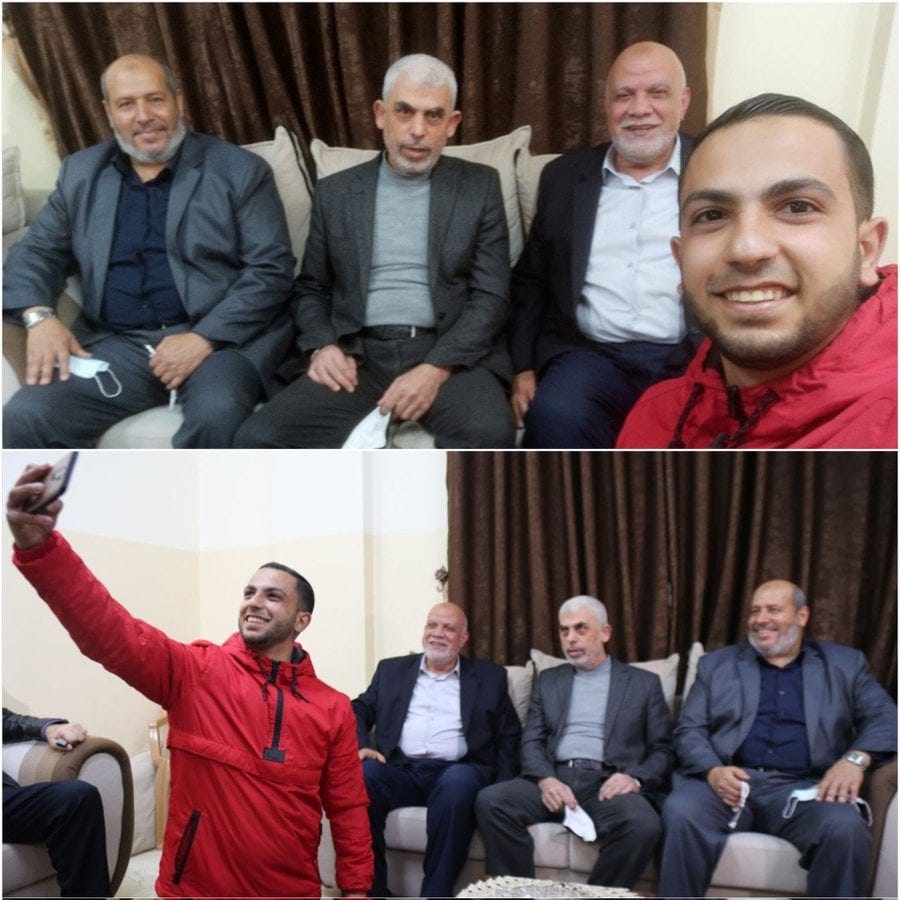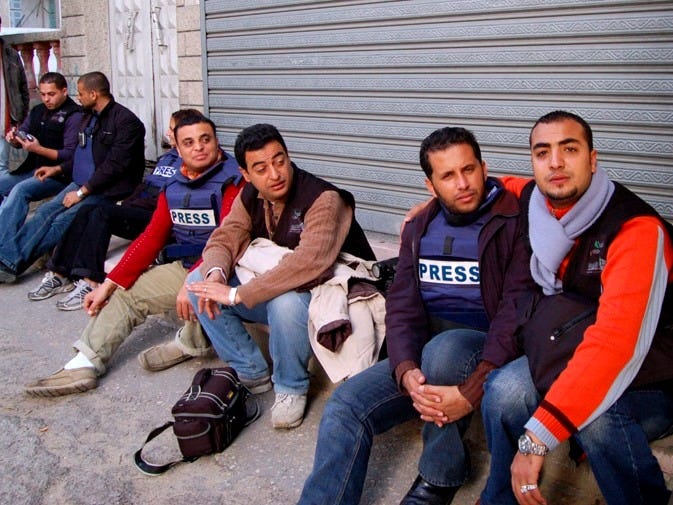Israel has every right to target Al Jazeera in Gaza.
The Israel-Hamas conflict is not just about bombs and bullets. It also involves heavily biased hashtags, headlines, and live feeds — propagated, in large part, by the Qatari outlet against Israel.
Please consider supporting our mission to help everyone better understand and become smarter about the Jewish world. A gift of any amount helps keep our platform free of advertising and accessible to all.
This is a guest essay written by Andrew Fox, a former British Army officer and current think tank research fellow focusing on defense, the Middle East, and disinformation.
You can also listen to the podcast version of this essay on Apple Podcasts, YouTube Music, YouTube, and Spotify.
Editor’s Note: Countries and international organizations expressed alarm Monday over alleged repeated targeting of journalists in Gaza after an Israeli strike killed a prominent Palestinian journalist for Qatari broadcaster Al Jazeera, 28-year-old Anas Al-Sharif, whom the IDF has long accused of being a Hamas terrorist in charge of rocket launching.
The usual candidates are up in arms about the IDF killing Al Jazeera journalist, Anas Al-Sharif.
These outraged commentators seem to have overlooked the substantial evidence that he was an active member of Hamas’ Al-Qassam Brigades, and therefore an entirely legitimate target.
“The terrorist Anas al-Sharif served as a cell leader in the Hamas terror organization and advanced plans for rocket fire against Israeli civilians and IDF forces,” the IDF said in a statement.
However, I would go further than that. I will now make the case that he was a legitimate target precisely because he was an Al Jazeera journalist.
There is a dangerous myth in modern conflict: that “combatant” means a man with a rifle or a woman in a uniform. The misunderstanding is that, unless you are pulling a trigger, you are somehow outside the fight. This is a comforting belief, especially for those who think war is neatly contained to trenches, tanks, and troops. However, in the 21st century, that is no longer true, and under the Law of Armed Conflict, it has not been true for a long time.
“Participation in hostilities” is the legal point at which a civilian ceases to be protected from being targeted. This does not only refer to kinetic actions; it encompasses any act that is likely to negatively impact the military operations or capacity of a party to the conflict. During the Second World War, this included railway switchmen guiding troop trains. In Afghanistan, it referred to unarmed insurgent spotters on hilltops radioing in troop movements.
Today, I contend that it also means information warriors.
Modern militaries no longer see information merely as a support tool. Instead, it is established as a joint force function, equal to manoeuvre, fires, and sustainment. NATO doctrine, U.S. joint publications, and even Israel’s operational concepts treat the information environment as a domain where decisive effects can be attained.
In Gaza, the battle is not just fought in tunnels and streets. We are all too well aware that it is also fought in newsrooms, on satellite feeds, and across social media timelines. No single outlet has played a more pivotal role in shaping the global perception of the battlefield narrative than Al Jazeera.
Journalism is not a crime, even in war. Legitimate, good-faith journalists should never be military targets. However, the legal considerations shift if a media organisation, especially one funded by a party to the conflict, moves from just reporting to actively participating.
Al Jazeera is not a neutral observer; it is the flagship media arm of Qatar, a state that funds Hamas directly through hundreds of millions in cash infusions into Gaza. Qatar also provides political sanctuary, hosting Hamas leadership openly in Doha, and runs strategic information campaigns amplifying Hamas narratives and suppressing their atrocities. This is not independent journalism; it is state-directed strategic communication, explicitly designed to influence the conduct of hostilities.
And oh boy has it worked. Hamas’ dominance of the information battlespace has been on a par with any battlefield victory the IDF has won in Gaza. The role of Al Jazeera’s coverage has been decisive. They have had a critical role in bringing international pressure by saturating global audiences with emotive, selective imagery. This has mobilised street protests, driven foreign policy debates, and generated calls for ceasefires.
What’s more, such pressure has materially constrained Israel’s freedom of manoeuvre, forcing the IDF to alter targeting timelines, suspend operations, and accept increased risk to its own troops. Therefore, by shaping global perception, Al Jazeera has increased the political cost of decisive action by the IDF, giving Hamas operational breathing space and prolonging the conflict. If that is not “direct participation in hostilities” under the Law of Armed Conflict, then nothing is.

The International Committee of the Red Cross sets out three criteria for direct participation in hostilities:
In order to qualify as direct participation in hostilities, a specific act must meet the following cumulative criteria:
the act must be likely to adversely affect the military operations or military capacity of a party to an armed conflict or, alternatively, to inflict death, injury, or destruction on persons or objects protected against direct attack (threshold of harm), and
there must be a direct causal link between the act and the harm likely to result either from that act, or from a coordinated military operation of which that act constitutes an integral part (direct causation), and
the act must be specifically designed to directly cause the required threshold of harm in support of a party to the conflict and to the detriment of another (belligerent nexus).1
Al Jazeera’s conduct fulfils all three criteria. The harm threshold is satisfied because their broadcasts have directly compromised IDF operations. A clear causal link exists between narrative shaping and operational constraints. This is well-documented and observable. Additionally, there is a belligerent nexus as their editorial stance explicitly aligns with Hamas’s strategic objectives and Qatar’s geopolitical interests.
Once those criteria are fulfilled, civilian protection is paused for as long as they participate. This is where the conversation becomes uncomfortable. We have been conditioned to see journalists as sacred non-combatants. Indeed, genuine independent journalism remains vital and protected, and there must be space for reporting mistakes, but this protection is not absolute.
But when a media outlet ceases to operate as an independent actor and instead functions as an operational asset of a belligerent party, it steps onto the battlefield, and on the battlefield, law and morality both demand that those who fight are treated as participants in the war.
Never mind that Al Jazeera’s journalists in Gaza double as active terror group members. Above and beyond that, I put it to you that the IDF is within its legal rights under the Law of Armed Conflict to treat Al Jazeera’s Gaza-based personnel, facilities, and transmission infrastructure as legitimate military objectives. There is a further argument that Al Jazeera facilities worldwide have become actively involved in the conflict and, therefore, are legitimate military targets.
The conflict in Gaza is not just about bombs and bullets; it also involves hashtags, headlines, and live feeds. In that landscape, an enemy’s ability to wage war is not solely measured in rockets and rifles, but also in narrative dominance. Pretending otherwise does not make us more humane. It just leaves one side fighting with one arm tied behind its back.
The shocking global disinformation storm surrounding Gaza has been notable for its lack of accountability for major news outlets knowingly lying about the war and spreading falsehoods. If nothing else, establishing a clear threshold for crossing between journalist and targetable combatant might make these deceitful media organisations and reporters reconsider their journalistic standards.
“Direct participation in hostilities.” casebook.icrc.org.



If this conflict were treated in an unbiased manner, it would not make the news at all. Sudan has higher civilian casualties and much more starvation. Ukraine has greater geopolitical implications. Israel pounding on a terrorist cell right on its border is not geopolitically important, and there is no genocide or starvation. If it did not involve that ancient tribal people with its ancient tribal God, no one would even notice.
‘Journalist’ has his picture, smiling in delight, taken with the Leadership of a Terrorist Organisation and then publishes the pictures. Enough said. You are a combatant, Dude. But as you say correctly in your post, neutral journalists are not targets. And nor are they in this conflict.